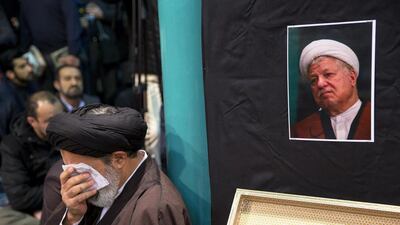Abu Dhabi // Rulers and officials of the GCC on Monday sent messages of condolence to the Iranian president and the family of Akbar Hashemi Rafsanjani, the senior revolutionary figure and pragmatist who had developed good relations with member states and presided over a thaw in Tehran’s relations with Riyadh during his tenure as president.
Rafsanjani died on Sunday at the age of 82 after suffering a heart attack.
Saudi Arabia was the only GCC member not to send condolences or make an official statement on Rafsanjani’s death, despite the cleric politician’s close relationship with the late King Abdullah and his efforts to achieve a detente between the two countries in the 1990s.
The President, Sheikh Khalifa, and Vice President Sheikh Mohammed bin Rashid, as well as the Crown Prince of Abu Dhabi Sheikh Mohammed bin Zayed, Deputy Supreme Commander of the Armed Forces, sent letters of condolence to Iranian president Hassan Rouhani and Rafsanjani’s family.
Minister of State for Foreign Affairs Anwar Gargash, who has been a strident public critic of Tehran, wrote on his Twitter account that Rafsanjani had been “one of the voices of political realism and moderation” in Iran.
Bahrain has accused Iran of sponsoring Shiite militants in the kingdom, but King Hamad bin Isa Al Khalifa said he was “praying to almighty God for [Rafsanjani’s] soul to rest in peace and inspire Iran’s president, its people and his family”.
The words of commiseration from Gulf countries over the passing of a senior figure in a country they consider their greatest security threat were not surprising given Rafsanjani’s history of diplomacy. During his presidency from 1989 to 1997, which came after the devastating Iran-Iraq war, he sought to change his country’s stance towards regional economic integration and greater cooperation with Iran’s Arab neighbours, rather than confrontation.
“Rafsanjani was a pragmatist through and through and during his tenure as president much of his foreign policy was predicated upon rebuilding Iran’s relations not just with the wider world but very specifically with the GCC,” said Sanam Vakil, a professor at the Johns Hopkins School of Advanced International Studies-Europe. “And he is remembered fondly for building those bridges.”
Saudi-Iran relations had broken completely in 1987 after Iranian pilgrims were killed during a protest during the Haj. “But when Rafsanjani became president his rapprochement with Saudi Arabia resulted in almost a decade of very positive, constructive political and commercial relations, as well as cultural,” Ms Vakil said. “That was the apogee of Saudi-Iranian positive relations, which then began to decline during [Mahmoud] Ahmadinejad’s presidency.”
In an interview with the news website Al Monitor in 2015, Rafsanjani said that King Abdullah had personally invited him to perform Haj during the last years of the monarch’s life. He also told the website that Iran did not have an inherent problem with Riyadh, “because they are Islamic and we see cooperation with them as a priority”.
Above all else, Rafsanjani believed that Iran should avoid being marginalised globally and isolated regionally, and that better relations with the GCC would benefit Iran’s economy and would lead to greater regional integration, she added.
Rafsanjani was a towering figure in Iran, a confidant of supreme leader Ayatollah Ali Khamenei who never wavered in his support for the country’s regime and political system, even after he backed the Green Movement in 2009 and became a protector and champion of Iran’s relative moderates and reformers.
“Rafsanjani has been reincarnated in many forms,” Ms Vakil said.
Although his political power waned along with the reformist movement’s momentum in the early 2000s and was curtailed further by Ayatollah Khamenei after the 2009 unrest, behind the scenes Rafsanjani remained an important player and deal maker who sought to bolster his protege Mr Rouhani and the centrist pragmatist factions he now leads.
He also continued to be chairman of the Expediency Council, the state body that mediates between the decision-making clerics of the Guardian Council and the parliament, which represents the Iranian political spectrum.
Rafsanjani’s death comes at a time of uncertainty in Iran, with regional tensions increasing, a hostile new US administration and the senior leadership beginning to reach old age. Mr Rouhani is standing for re-election in May against right-wing conservatives who oppose both the president’s signature nuclear deal and the greater economic and social liberalism the centrists support.
While some observers believe Rafsanjani’s passing could strengthen the position of hardliners in the election, others think it may benefit Mr Rouhani because of his mentor’s tarnished image in many Iranians’ eyes.
“People had begun to lose faith in him and ability to influence politics,” Ms Vakil said. “People were cynical about his bloody and dirty hand in the darker sides of Iran’s political history, and his corruption,” she added, referring to the murders of opposition figures in the 1990s.
She said Mr Rouhani retained support among Iranians despite setbacks around the nuclear deal. “I wouldn’t underestimate the strength of the centrist, pragmatic Rouhani camp to survive without Rafsanjani.”
More importantly, Mr Rouhani does not appear to have lost Ayatollah Khamenei’s support. “The person that matters is still alive,” Ms Vakil said. “And as long as Rouhani maintains Khamenei’s backing, I think that is the best barometer for what could happen in May.”
tkhan@thenational.ae

